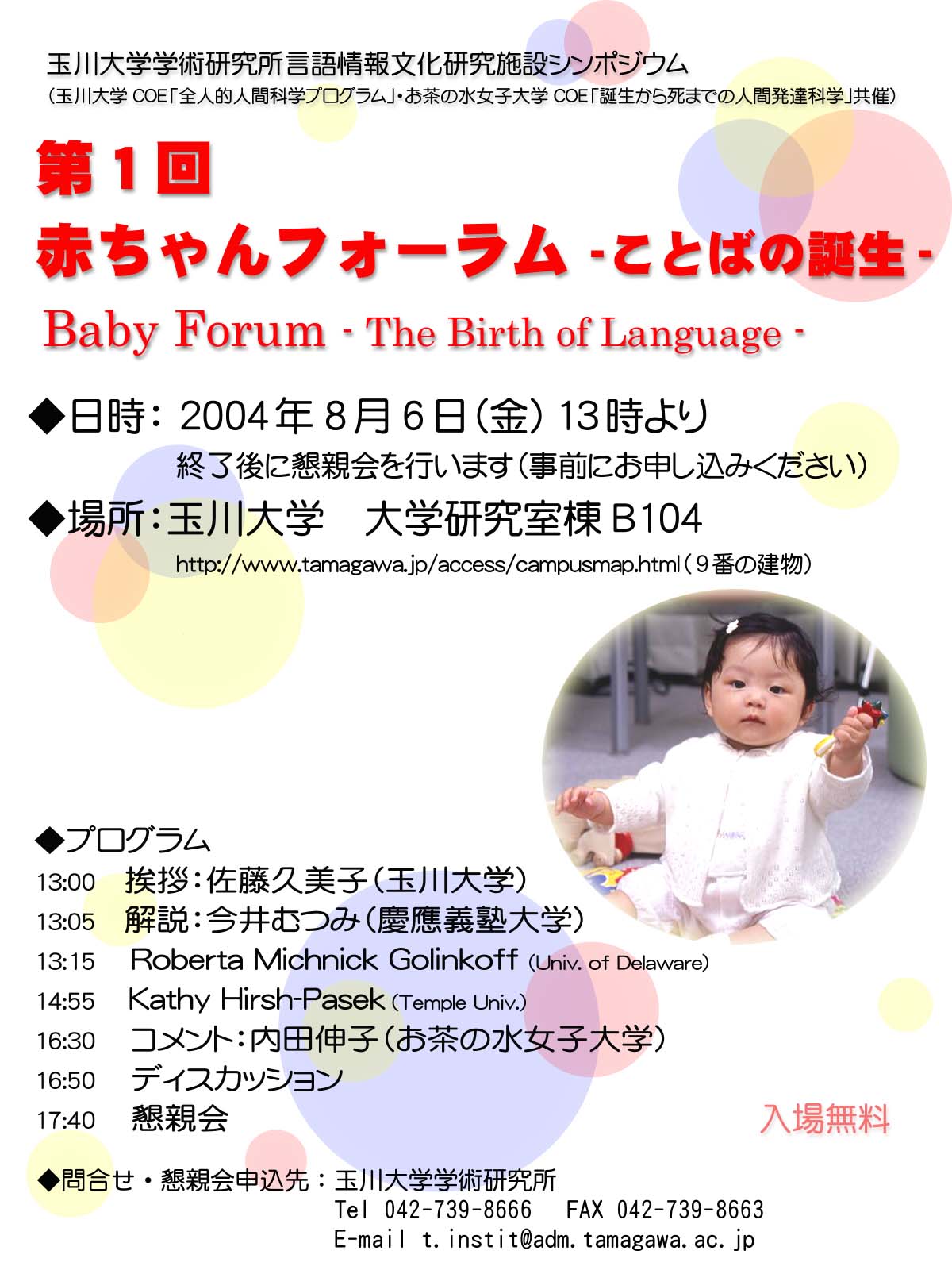第1回「赤ちゃんフォーラム」が開催されます
Baby Forum - The Birth of Language

本イベントは無事終了いたしました。多数のご参加ありがとうございました。
このたび玉川大学学術研究所言語情報文化研究施設「赤ちゃんラボ」では、玉川大学21世紀COEプログラム「全人的人間科学プログラム」の研究活動の一環として、お茶の水女子大学21世紀COEプログラムとの共催で、「赤ちゃんフォーラム」を開催いたします。
本フォーラムは、国内外の研究者や大学院生、大学生、教育関係者をはじめ、ご興味のある一般の方まで幅広く対象にしており、皆様の研究交流、情報交換の場にできればと考えております。
第1回となる今回は、ことばの発達研究で世界的に著名なRoberta Golinkoff教授とKathy Hirsh-Pasek教授を米国からお招きし、子どものことばの発達について最新の研究成果をご講演いただきます。
Golinkoff教授は、子どもが生まれてから2歳になるまでのあいだに、物の名称(名詞)を学習する方法についてお話しくださいます。またHirsh-Pasek教授には、ことばを話し始める時期の子どもが、動作を表すことば(動詞)をどのようにして学習するのか、という問題について、様々な能力の発達と関連づけながらお話しいただきます。
なお、講演は英語で行われますが、赤ちゃんラボの参加研究者で、お二人の講演者と長く共同研究をされている今井むつみ先生(慶應義塾大学)に、日本語でわかりやすく解説をしていただきます。また、当日はフォーラム終了後に懇親会も予定しております。多数のご参加をお待ちしております。
詳細につきましては、下記の通りです。
概要
| 日時 | 2004年8月6日(金) 13:00~17:25 ※学内食堂にて懇親会17:40~19:30 |
|---|---|
| 場所 | 玉川大学 大学研究室棟 B104会議室(小田急線「玉川学園前駅」下車徒歩約7分) |
| 参加費 | 入場無料 ※懇親会:一般2,000円、学生1,000円 |
| 申込方法 | 事前の申込は必要ありません。当日会場受付までお越しください。なお、懇親会参加ご希望の方は下記まで事前にお申込みください。 ・玉川大学学術研究所 電話:042-739-8666 E-MAIL:t.instit@adm.tamagawa.ac.jp ・申込の際は、ご所属、氏名、連絡先をお伝え下さい。 ・懇親会参加費は、当日受付にてお預かりさせていただきます。 |
| 主催 | 玉川大学学術研究所 言語情報文化研究施設 |
| 共催 | 玉川大学21世紀COEプログラム 「全人的人間科学プログラム」 お茶の水女子大学21世紀COEプログラム 「誕生から死までの人間発達科学」 |
プログラム
| 13:00~13:05 | 挨拶:佐藤久美子(玉川大学文学部教授・学術研究所言語情報文化研究施設主任) |
|---|---|
| 13:05~13:15 | 解説:今井むつみ(慶應義塾大学環境情報学部助教授) |
| 13:15~14:45 | 講演(1):"Breaking the language barrier" Roberta Michnick Golinkoff (University of Delaware) |
| 14:45~14:55 | 休憩 |
| 14:55~16:25 | 講演(2):"The paradox of early verb learning" Kathy Hirsh-Pasek (Temple University) |
| 16:25~16:30 | 休憩 |
| 16:30~16:50 | コメント:内田伸子(お茶の水女子大学大学院人間文化研究科教授) |
| 16:50~17:20 | ディスカッション |
| 17:20~17:25 | 閉会の辞 |
| 17:40~19:30 | 懇親会(学内食堂) |
講演内容
Roberta Golinkoff "Breaking the language barrier"
How do children learn their first words? Psychology has adopted a myopic approach to this question suggesting either that they learn through association (Smith), or social pragmatics (Tomasello) or attention to linguistic input. This talk presents a hybrid theory of early word learning, The Emergent Coalition Model. Using a "wide-angle" lens on development, it suggests that children use perceptual, social and linguistic cues to solve the problem of mapping word to world. While all of these cues are available to learners at all times, they are differentially weighted throughout the course of development such that children first rely on associative perceptual mechanisms, then social information, and then language cues as they determine the mapping from word to world. In this process-based model, word learning principles become the products rather than the engines of development and no one theory reigns supreme. This talk not only presents the theoretical argument for a dynamic model of language development, but also provides the empirical data to support the model. Finally, we demonstrate how this broader model of language growth not only explains the changing nature of vocabulary growth in the first two years, but also insights into how atypical children (autistic children) might learn language.
Kathy Hirsh-Pasek "The paradox of early verb learning"
Verbs are difficult to learn. Most of the studies in early language acquisition report that nouns are learned before verbs and that nouns predominate in the vocabularies of young children. Yet, verbs do appear among children's first words. How do we reconcile these facts? In this talk, we suggest a developmental story ABOUT HOW children learn verbs. Our hypothesis is based on a common hurdle that children encounter in cognitive development: mapping relations across domains. To make our case we review studies from our labs on the non-linguistic conceptual foundations of verbs and on the role that linguistic and social factors might play in the process of verb learning.
関連サイト
お問い合わせ
玉川大学 学術研究所
〒194-8610 東京都町田市玉川学園6-1-1
電話:042-739-8666 FAX:042-739-8663 E-MAIL:t.instit@adm.tamagawa.ac.jp

